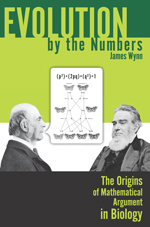Press Release: Evolution by the Numbers: CMU Professor’s New Book Examines How Biology Became Infused With Mathematical Arguments
Contact: Shilo Rea / 412-268-6094 / shilo@cmu.edu
 PITTSBURGH—Most people assume that mathematics and science always go hand in hand, but a look at history shows that was not always the case.
PITTSBURGH—Most people assume that mathematics and science always go hand in hand, but a look at history shows that was not always the case.
In “Evolution by the Numbers: The Origins of Mathematical Argument in Biology,” Carnegie Mellon University’s James Wynn explores the challenges of infusing mathematics into biology.
“The problem with science is that people think it is a neat and tidy, step-by-step logical progression of discoveries,” said Wynn, associate professor of English and rhetoric who teaches classes on the rhetoric of science. “People neglect to look back at how we got to this point of accepting math in science. The book looks at how this came to be and how messy it was.”
Even though it is difficult to imagine modern biology without math, Wynn takes readers back to when biologists did not believe math could contribute to solutions to biological problems, specifically questions dealing with heredity and variation. Drawing on the work of Charles Darwin, Gregor Mendel, Francis Galton, Karl Pearson and Ronald Fisher, Wynn shows the progression and regression of math’s acceptance. He also demonstrates how these individuals’ rhetorical savvy, or lack thereof, influenced its ascension or descent.
“It becomes clear that even these great scientists and mathematicians had to make an argument and then sell it,” Wynn said. “It illustrates the social and cultural dimensions of science.”
Using historical information and rhetorical analyses from the mid-19th century through the 1930s, Wynn shows how accepted mathematical principles became sources for arguments in the biological sciences. He also explores how this confluence of science, math and rhetoric contributed to developing the theories of variation, evolution and heredity in the 19th and 20th centuries.
Wynn, whose recent research interests include rhetoric, science, mathematics, and nuclear power and public policy, has published articles in “Rhetorica,” “Written Communication” and “19th Century Prose.” He also is a founder and current director of the Pittsburgh Consortium for Rhetoric and Discourse Studies.
For more information on “Evolution by the Numbers: The Origins of Mathematical Argument in Biology,” visit http://www.parlorpress.com/wynn.
Follow the Dietrich College of Humanities and Social Sciences on Twitter at @CMU_DietrichHSS.
###